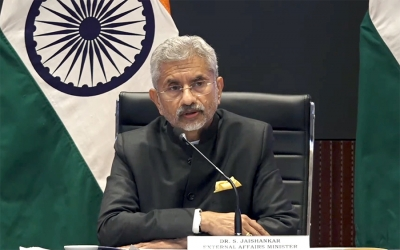London: India’s purchase policies softened the oil and gas markets by its decision to continue transactions with Russia and should be thanked for managing global inflation as a consequence, External Affairs Minister S Jaishankar has said.
During an interaction entitled ‘How a Billion People See the World’ at the Royal Over-Seas League here Wednesday evening, Jaishankar addressed the question of India charting its own course in the face of Western sanctions against Russia for its invasion of Ukraine.
He also reiterated the “exceptional steadiness” of India-Russia ties and pointed out that unlike in the West, Russia is not viewed as a “revisionist power” in the East.
“Just imagine for the moment had we not bought oil from Russia, global oil prices would have gone higher; because we would have gone into the same market, to the same suppliers that Europe would have done and frankly, as we discovered, Europe would have outpriced us,” said Jaishankar.
“We saw that in the LNG markets where the supplies traditionally coming into Asia go directly to Europe. And in fact, India was a big enough country to command some respect in the market, but there were much smaller countries that didn’t even get responses to their tender because the LNG suppliers were no longer interested in dealing with them. They have bigger fish to fry,” he said.
“So, we’ve actually softened the oil markets and the gas markets through our purchase policies. We have, as a consequence, actually managed global inflation. So frankly, we should be thanked. I’m waiting for the thank you,” he added.
On the broader India-Russia dynamic, Jaishankar reflected on the stability of the relationship dating back to the 1950s which indicated a certain “fundamental structural balance” which would keep bilateral ties even.
“My inference from that is that actually, both sides recognise the importance of the relationship in keeping a kind of a continental balance, if you would, in that part of the world,” he noted.
“Not just for India, but for countries east of Russia, it is a source of stability. Russia is not a revisionist power East of Russia… it is not automatic that if a country is perceived a certain way in the West, that logic would extend to the East. The perception of the East is very different,” he said.
Therefore, he highlighted that India’s approach to Russia in the context of the current conflict in Ukraine is very much factored by the 70-odd years of history and working together.
The External Affairs Minister reiterated that while he understood the Western approach on the issue, India’s views are influenced by its experiences of the past when as a newly independent country it was attacked by Pakistan and no one condemned it.
He elaborated: “In fact, it went to the UN Security Council, and thanks to the United Kingdom, what began as a problem called the aggression of Jammu and Kashmir, ended up as the India-Pakistan question.
“So, we have learned the hard way that people speak of principles, I don’t say they are irrelevant or be cynical about it, but they are tempered by interests. And in this particular case, we have a very powerful interest to keep our relationship with Russia.”
The question-and-answer session, organised by foreign policy agency Wilton Park, marked the minister’s final engagement in London as he concluded a five-day UK visit. It covered a wide range of topics, including India-China relations, the ongoing diplomatic row with Canada, and the socio-political changes underway in the country.
PTI






































